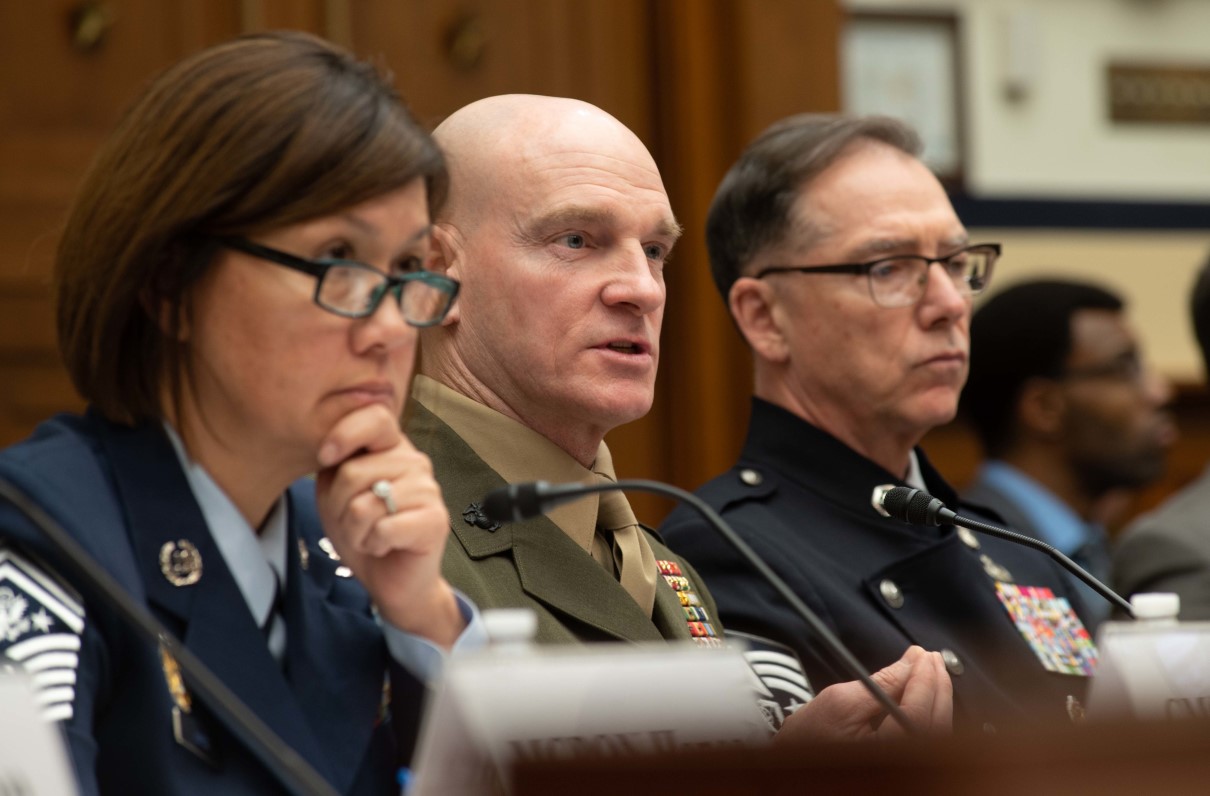Senior enlisted leaders from the Army, Marine Corps, Navy, Air Force, and Space Force didn’t shy away from the problems facing servicemembers and families in recent testimony before two congressional subcommittees. And while offering solutions and updates on a series of quality-of-life issues, they all pointed to a larger concern: The need for a national dialogue on the value of military service.
“We must increase the propensity, the desire to serve our nation,” cautioned Sgt. Maj. of the Marine Corps Troy E. Black. “Without a propensity to serve, we will see a challenge for the all-volunteer force.”
Congress, media, and society as a whole play an important role in answering this challenge. How we speak about military service matters when it comes to combating a “Perfect Storm” of a recruiting crisis, and though there are thousands of positive experiences shared, they continue to be overshadowed by negative “clickbait” stories.
As retirees, veterans, and survivors, MOAA members serve as “influencers” for all those considering military service – not just members of your own family. Recounting your positive experiences may motivate and drive those who will follow in your footsteps.
Key Issues Addressed
During a House Armed Services Personnel Subcommittee Senior Enlisted Leaders Perspective hearing, and in a House Appropriations Military Construction (MilCon), Veterans Affairs, and Related Agencies Subcommittee oversight hearing titled Quality of Life in the Military, the enlisted leaders spoke candidly about the issues impacting servicemembers and their families. Topics ranged from the downsizing of military treatment facilities (forcing some to travel more than an hour to seek health care) to the “responsibility gap” that has closed between what is expected of commissioned officers and noncommissioned officers.
- Chief Master Sgt. of the Air Force JoAnne S. Bass reminded lawmakers “you recruit the servicemember, you retain the family.” noted that cuts to MilCon spending would lead to difficult decisions about reducing existing quality of life programs.
- Sgt. Maj. of the Army Michael A. Grinston asked appropriators for predictable and sustained funding to invest in barracks, dining facilities, and child development centers.
- When asked about proposed cuts to discretionary spending in the FY2024 budget, Master Chief Petty Officer of the Navy James M. Honea responded, “People are a top priority, but operational urgencies will trump quality-of-life programs.” At a time when all the services are struggling with recruitment, cuts to quality-of-life programs will exacerbate the already negative narrative.
[SHARE YOUR STORY: How Much Are You Paying Out-of-Pocket for Housing?]
Across the panel, in both hearings, the leaders praised the strength of our enlisted ranks but also stressed the need for compensation to keep up with increased expectations and responsibilities. To maintain an all-volunteer force, services must have the funding and resources to ensure their soldiers, Marines, sailors, airmen and guardians are financially stable; have adequate, safe housing; and can access child care and/or high-quality schools.
Several lawmakers noted a common theme in the headlines for the last two years has been food insecurity and economic instability in the ranks. Senior enlisted leaders agreed, noting efforts from DoD and the individual services, such as the temporary Basic Allowance for Housing adjustments in 2021 and 2022 and the introduction of the basic needs allowance; however, they all said more needs to be done.
Servicemembers and their families need the support of the nation they serve. “The most decisive warfighting advantage is the human beings who serve in the military,” said Chief Master Sergeant of the Space Force Roger A. Towberman.
[TAKE ACTION: Urge Lawmakers to Support the Major Richard Star Act]
We must come together as a nation to discuss the challenges facing servicemembers and their families, to determine effective solutions, and to prioritize the needs of those who choose to serve.
As a military and veterans service organization, MOAA is committed to supporting those who have served, their families, and survivors. But it is also incumbent upon organizations like MOAA to help convey the value of military service to the next generation.
PREMIUM Membership Comes With So Many Benefits. Are You Taking Full Advantage?
Find out just how many benefits are waiting for you, and start using them TODAY.

